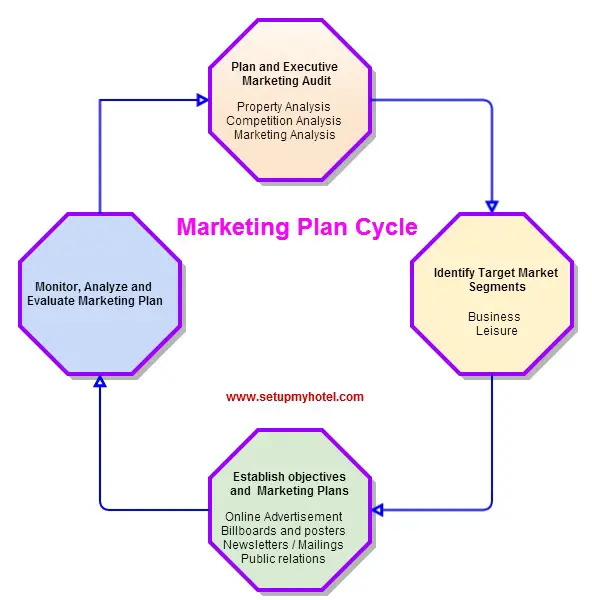Marketing Plan in the Hospitality Industry
The hotel marketingA system of interrelated activities formulated to plan; price; promote and make available the servic... mix is a set of strategies used by hotels to promote their products and services to potential customers. It includes the four Ps of marketing: product, price, place, and promotion.
Product refers to the hotel’s physical offering, such as rooms, amenities, and services. Hotels often differentiate themselves based on the quality and uniqueness of their products. For example, some hotels offer luxury suites with personalized butler service, while others provide budget-friendly rooms with basic amenities.
Price is the amount that customers pay for the hotel’s products and services. It is important for hotels to set prices that are competitive within the market, while also considering their own costs and profit margins. Dynamic pricing strategies are commonly used in the hotel industry, where prices may fluctuate based on demand and seasonality.
Place refers to the distribution of the hotel’s products and services. This includes the location of the hotel, as well as the channels through which customers can book their stay. Hotels may sell rooms through their own website, online travel agencies, or through travel agents.
Promotion involves the marketing and advertising efforts that hotels use to reach potential customers. This includes tactics such as social media marketing, email marketing, and search engine optimization. Hotels may also offer special promotions or discounts to attract customers.
By effectively utilizing the hotel marketing mix, hotels can increase their visibility, attract more customers, and ultimately improve their bottom line.
The hotel can take several ways below are some of the key steps in a marketing plan.
- Conducting Marketing AuditAudit is a verification of accounting procedures and records..
- Identifying Market Segments.
- Marketing objectives and medium.
- Analyzing and evaluating the marketing plan.
Conducting Marketing Audit:
A marketing audit is considered the foundation of any hotel marketing plan. It mainly consists of three core parts such as 1) Property AnalysisAnalysis is the assessment of the flow of information and services of a specific property to determi..., 2) Composite or Competition Analysis, and 3) Marketplace Analysis.
Property Analysis helps to identify the strengths and weaknesses of your hotel. A checklist is made by the sales team which consists of the strengths and weaknesses of revenue-generating and non-revenue generating areas. The checklist should also consider the location, brand value, and reputation of the hotel.
Competition Analysis helps to position your property and also to identify profitable market segments like Groups, FITFIT means Free Independent Traveler or Free Independent Tourist. A FIT is an individual or family or..., Corporate, etc. with your hotel and competitors.
Marketplace analysis helps the hotel to establish the hotel’s current position in the market and also to identify the potential opportunity to promote the hotel.
Identifying Target Market Segments:
The sales team should not concentrate on one single market segment, because a hotel is a series of business that caters to different markets. Eg: GuestDefinition of Guest in Hospitality Industry: A guest is the most important person in any business. A... rooms are primarily sold to business customers during weekdays but the same rooms can be also in demand for leisure guests during the weekend.
The key point is to identify the most profitable and satisfiable market segments and then target the same. The best way to identify the correct marketing mix for the hotel is to prepare a marketing mix chart.
Establish objectives and Marketing Plans:
Once the marketing objectives are completed the next step is to define specific marketing objectives. Marketing objectives must be easily understandable, realistic, challenging, and also measurable.
Identify the best mediums to reach the targeted market segments eg: Online promotions, Social media, Billboards, direct sales calls, etc.
Clear marketing budgets are to be defined for advertising, consulting, and promotional expenses.
Monitor Analyse and Evaluate:
The Marketing plans need to be reviewed periodically so that if required corrective measures can be taken immediately. These data also help future marketing activities and programs.











